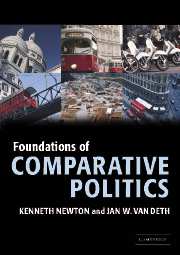Book contents
- Frontmatter
- Contents
- Acknowledgements
- List of briefings
- List of fact files
- List of controversies
- List of tables
- List of figures
- List of abbreviations and acronyms
- Key terms and concepts
- PART I The state: origins and development
- PART II The polity: structures and institutions
- PART III Citizens, elites and interest mediation
- PART IV Policies and performance
- Glossary of key terms
- Index of names
- Index of subjects
PART II - The polity: structures and institutions
- Frontmatter
- Contents
- Acknowledgements
- List of briefings
- List of fact files
- List of controversies
- List of tables
- List of figures
- List of abbreviations and acronyms
- Key terms and concepts
- PART I The state: origins and development
- PART II The polity: structures and institutions
- PART III Citizens, elites and interest mediation
- PART IV Policies and performance
- Glossary of key terms
- Index of names
- Index of subjects
Summary
Part I of this book considered the nature and development of the modern democratic state in general terms. Part II looks more closely at internal structures and institutions – sometimes referred to as the ‘machinery of state’ or the ‘nuts-and-bolts of government’, because they are the permanent structures of the political system. They are important because they set the framework within which individuals and organisations behave in everyday political life. In this sense we can distinguish between government, with its formal structures and institutions, on the one hand, and politics, with its political behaviour and processes, on the other. Following this distinction, Part II concentrates on structures and institutions of government, while Part III focuses on the political behaviour of individuals, groups and organisations. Although this is a convenient and useful way of dividing up the book, we should not forget that structures influence and mould behaviour, just as much as behaviour helps to create structures. Although it is useful to distinguish between the institutions of government and the processes of politics, the two are simply different sides of the same coin.
Chapter 3 deals with the constitutional framework of modern democracies. Constitutions are sometimes overlooked in modern comparative politics, but the fact is that they are enormously important. They try to grapple with the basic problem of all democracies – how to balance the necessary powers of the state against the individual rights of citizens, and how to ensure that government does not become too powerful and remains responsible and accountable to its citizens.
- Type
- Chapter
- Information
- Foundations of Comparative Politics , pp. 39 - 40Publisher: Cambridge University PressPrint publication year: 2005

